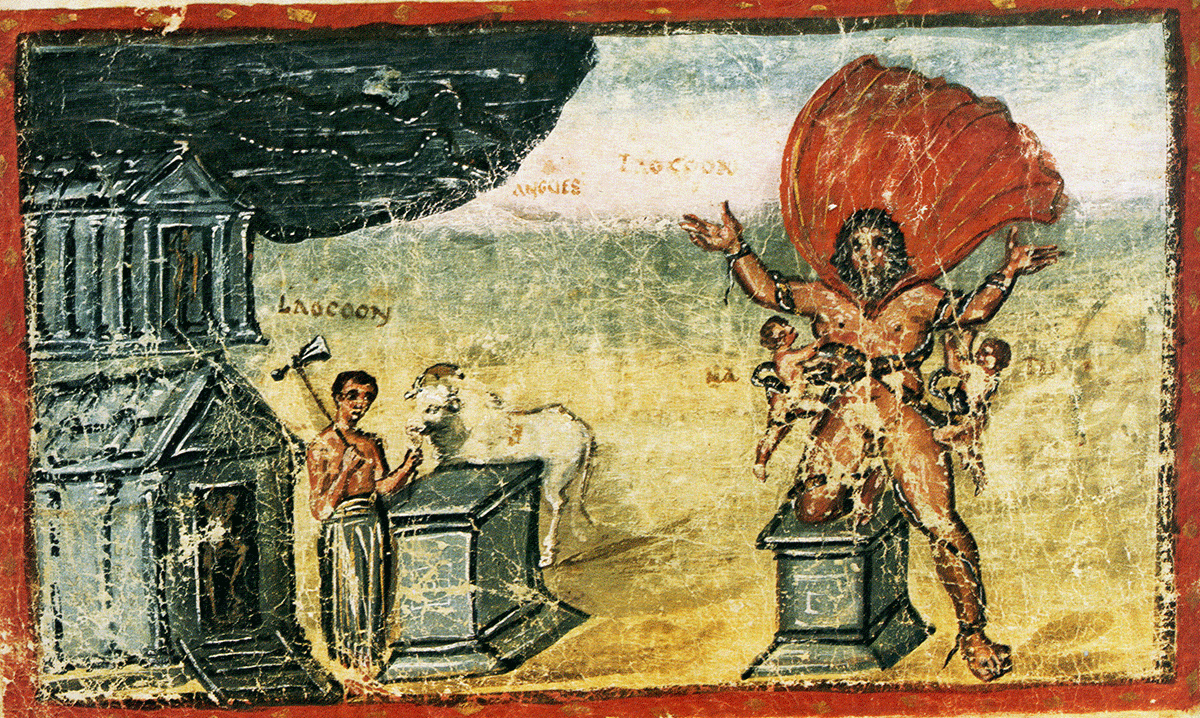November 02, 2014
Coming to the Ruane Great Room: A 12-hour Virgil Marathon

By Vicki-Ann Downing
Virgil wrote the Aeneid, his epic poem about the founding of Rome, to be read aloud and enjoyed in public. Providence College’s Development of Western Civilization Program will renew that tradition with a Virgil Marathon on Thursday, Nov. 20, 2014, in the Ruane Center for the Humanities.
Freshmen and sophomores in the DWC Program, along with faculty, staff, and administrators, will begin reading the 12 books of the Aeneid at 7:30 a.m. in the Ruane Center’s Great Room. The College community is invited to stop by throughout the day. Refreshments will be provided. The marathon is expected to conclude around 7:30 p.m.
Reading aloud the classic works from western civilization is becoming a DWC tradition, said Dr. Steven C. Smith, assistant professor of history. Smith organized last semester’s reading of Milton’s Paradise Lost, also in the Great Room, and is coordinating this semester’s Virgil Marathon with support from Dr. Vance G. Morgan, DWC Program director and professor of philosophy, and faculty colleagues.

“It’s what makes us different here,” said Smith. “What sets us apart at PC is that we try to pull in as many students, faculty, and staff as possible. We want to include the campus community because everybody here takes four semesters of Civ.”
Smith, who joined the PC faculty in September 2013, remembers that when he was a student at Wright State College in Dayton, Ohio, and at the University of Missouri, small groups from English classes or literary clubs would stage readings of classic works in the library or on the quad.
“It hit me over winter break last year that Providence is the perfect place to do this. It’s small enough, and students are familiar with the texts,” Smith said.
Last semester’s Milton Marathon drew 250 readers, including College President Rev. Brian J. Shanley, O.P. ’80 and a half-dozen faculty. Theatre students did “a couple of remarkable readings,” and the final book was begun by Dr. Russell M. Hillier, associate professor of English, “in his wonderful British accent,” Smith said.
This year, the Aeneid’s opening line, “Arma virumque cano” — “This is the story of a man and his struggle”— will be read in Latin by members of the Classics Club. The start of the final book will be read in Latin, too, by Dr. Robin J. Greene, assistant professor of history.
At PC, one in four professors, representing 18 academic departments, teaches Civ. Assisting Smith with the marathon are Dr. Alexander N. Moffett, assistant professor of English, whose research specialty is modern British fiction, and Dr. Christopher A. Parrot, adjunct assistant professor of English, whose specialty is ancient literature.
The marathon’s sponsors are the DWC Program, School of Arts & Sciences, Liberal Arts Honors Program, Center for Engaged Learning, and the departments of English, history, philosophy, and theology.
Smith’s own research area is the American Revolution, but when he started at PC last year, his first class was teaching The Iliad to freshman in DWC, he said.
Over the next two weeks, most DWC teams are studying Virgil, including 80 percent of all freshmen. The public reading will “bring everyone together to experience an ancient text as it was meant to be, spoken aloud to audiences,” Smith said.
“It’s meant to take you out of the dimly lit room where you’re cramming,” said Smith. “It’s meant to be enjoyed in public. And this is a great way to nurture some of the skills students are continuing to develop in Civ, like public speaking.”
The Great Room, which opened with the Ruane Center in September 2013, has become the “de facto study hall. Students really have taken ownership of it,” Smith said. “The Ruane Center is such a highly trafficked building that last year, when people saw a crowd, it created a natural curiosity to check it out.”
Smith is already thinking about next semester’s marathon, with Dante’s Inferno in the spotlight. He has hopes of eventually involving alumni, too.
“It connects every current student in Civ, and every former Civ student, and alumni who have fond memories of Civ and who look back and say, ‘Civ helped me become what I am today,’” said Smith.
“I really believe in what we do here — that you’re getting a very deep liberal arts education that will help you prepare for the job market in whatever field you choose.”





